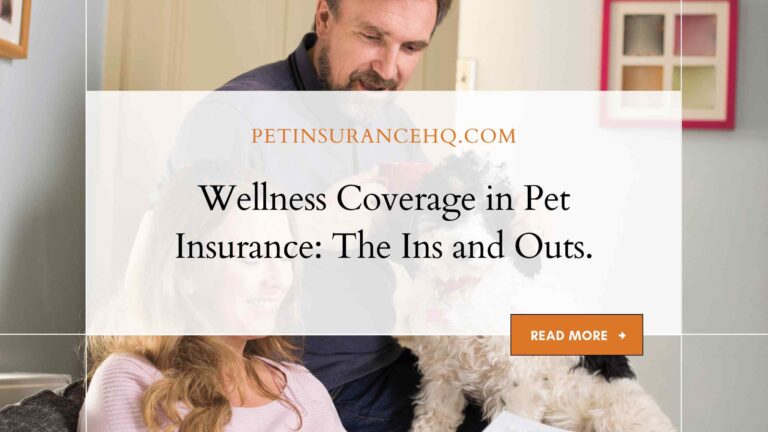The Benefits of Illness Coverage in Pet Insurance Policies
As pet owners, we do our best to keep our furry friends healthy and happy, but unfortunately, unexpected health issues can arise out of nowhere. As much as we hope it never happens, the reality is that pets get sick or injured just like humans do. So how can you protect your pet from expensive veterinary bills? The answer is simple: illness coverage in your pet insurance policy.
In this blog post, we’ll explore the many benefits of illness coverage for your four-legged family member and why it should be a crucial part of any comprehensive pet insurance plan. Grab a cup of tea (or coffee) and let’s dive into the world of pet healthcare!
What is Pet Insurance?

Just like human health insurance, pet insurance is designed to help ease the financial burden of unexpected veterinary bills. Pet insurance policies typically reimburse you for a portion of your vet bill after you pay the bill in full. Some policies even cover preventive care, such as vaccinations and routine check-ups.
There are two main types of pet insurance: accident only and comprehensive. Accident only policies cover, you guessed it, accidents. These are the most common and least expensive type of pet insurance policy. Comprehensive policies cover both accidents and illnesses. These tend to be more expensive but offer greater peace of mind.
When considering a pet insurance policy, be sure to read the fine print carefully. Some policies have age limits, breed exclusions, waiting periods, and other restrictions that you’ll want to be aware of before buying a policy.
The Benefits of Illness Coverage in Pet Insurance Policies
Pet health insurance is a relatively new product that offers financial protection in the event your pet becomes ill or injured. Most policies reimburse you for a percentage of your veterinarian bills, and some also cover preventive care and routine wellness visits.
There are many benefits to having illness coverage in your pet insurance policy. Perhaps the most obvious benefit is that it can help relieve the financial burden of unexpected veterinary bills. Unexpected illnesses can be very costly, and having pet insurance can help ease the financial stress associated with these events.
In addition to helping with unexpected veterinary bills, illness coverage in your pet insurance policy can also help you budget for your pet’s healthcare costs. Having an idea of what your monthly premiums will be can help you better prepare for future veterinary expenses. Additionally, many pet insurance companies offer discounts on preventive care when you purchase a policy that includes coverage for illnesses. This means that not only can you save money on unexpected veterinary bills, but you can also save money on routine wellness visits and preventive care.
Having illness coverage in your pet insurance policy can give you peace of mind knowing that you are prepared for anything that comes up. No one knows when their pet may become ill or injured, but having a policy in place can give you the peace of mind knowing that you are prepared financially should something happen.
How Does Pet Insurance Work?
Most people are familiar with health insurance for humans, but did you know that there is such a thing as pet insurance? Pet insurance works in much the same way as human health insurance, and can be a great way to financially protect your furry friend in the event of an unexpected illness or injury.
Just like with human health insurance, pet insurance policies come in a variety of coverage levels, so you can choose the policy that best meets your needs. Some pet insurance policies will cover only accidents, while others will cover both accidents and illnesses. Some policies will have a deductible that you will need to pay before the policy kicks in, while others will have no deductible.
Once you have selected the right pet insurance policy for your needs, you will need to pay premiums each month (or year) in order to keep the policy active. If your pet ever becomes ill or injured, you will then need to submit a claim to the pet insurance company along with any relevant veterinary bills. The pet insurance company will then reimburse you for a portion of those bills, based on the coverage level you selected.
Pet insurance can be a great way to financially protect your beloved furry friend, and give you peace of mind knowing that they are covered in case of an unexpected accident or illness.
What Types of Coverage Are Available?
There are a number of different types of coverage that are available when you purchase a pet insurance policy. The most common type of coverage is for illnesses and accidents. This type of coverage will help to pay for the medical bills associated with your pet if they become ill or are injured in an accident. Other types of coverage that are available include well-being coverage, which helps to pay for routine care such as vaccinations and check-ups, and lifetime coverage, which covers your pet for their entire life.
Pros and Cons of Illness Coverage in Pet Insurance
There are a few key things to keep in mind when considering whether or not illness coverage in pet insurance is right for you and your furry friend. The first is that, like with all insurance policies, there will be premiums to pay – meaning that you’ll need to factor this extra cost into your budget. Secondly, it’s important to remember that pet insurance is designed to reimburse you for eligible medical expenses incurred after the policy is in place; it will not cover pre-existing conditions.
Now, let’s take a look at some of the pros and cons of illness coverage in pet insurance:
Pros:
- Helps reimburse you for unexpected illnesses or injuries that your pet may experience
- Gives you peace of mind knowing that you have financial protection in place should something happen to your furry friend
- May help you save money on veterinary bills in the long run if your pet ends up needing extensive or ongoing treatment for an illness or injury
Cons:
- Premiums can be expensive – make sure you compare quotes from different insurers before making a decision
- Won’t cover pre-existing conditions – so if your pet has any health issues when you take out the policy, they won’t be covered
- You may have to pay a deductible before the insurer starts reimbursing you for eligible medical expenses
Alternatives to Pet Insurance
When it comes to insuring your pet, there are a few different options available to you. While pet insurance is the most comprehensive option, there are also some alternatives that can provide similar coverage. Here are a few of the most popular alternatives to pet insurance:
- Pre-paid Veterinary Plans: Pre-paid veterinary plans are becoming increasingly popular as an alternative to pet insurance. These plans typically cover a set number of office visits or procedures per year, and can often be used at any vet of your choice. This can be a great option if you have a regular vet that you trust and want to continue using.
- Credit Cards with Pet Insurance Benefits: Some credit cards offer pet insurance benefits as part of their rewards programs. This can be a great way to get some basic coverage for your pet without having to sign up for a separate policy. However, it’s important to read the fine print on these offers, as they often have strict requirements and limitations.
- Discounted Veterinary Services Plans: There are also a number of companies that offer discounted veterinary services plans. These plans typically give you access to discounted rates on office visits and procedures at participating vets. This can be a great option if you don’t mind doing some research to find participating vets in your area.
- Self-Insurance: For those who want complete control over their pet’s healthcare costs, self-insurance is an option worth considering . This involves saving up a certain amount of money in the event that your pet needs medical care. While this can be effective, it requires you to have the financial resources up front in order to be successful.
Conclusion
Pet insurance policies are a valuable asset for pet owners, as they provide protection against the costs of unexpected illnesses and injuries. With policies specifically designed to cover treatment for illnesses ranging from minor to serious, pet owners can have peace of mind that in the event of an emergency or illness their beloved fur babies will have access to quality care. The benefits of having such coverage in place make it well-worth considering adding one of these plans to your own collection – but remember to do your due diligence when selecting both a provider and policy.







